Scientists surveying the Upper Gulf of California for the critically endangered vaquita porpoise found just eight individuals, marking the lowest survey result ever and a drop from the 10 to 13 individuals estimated in 2023.
The vaquita porpoise is one of the most endangered animal species on the planet and only lives in the Northern Gulf of California off the coast of Mexico. The species had roughly 570 total members left in 1997, but that number has continuously dropped and now is at its lowest level ever, the New York Times reported.
According to the Sea Shepherd Conservation Society, unlike the 2023 survey, no newly born calves were spotted; but, one healthy yearling was seen. The survey focused on the “Zero Tolerance Area,” a region where fishing of any kind has been banned in an attempt to save the species from extinction.
“While these results are worrying, the area surveyed represents only 12 percent of the total area where vaquitas were observed in 2015,” Barbara Taylor, who led the evaluation of the species, said.
The biggest threat to the vaquita is illegal fishing in the gulf for a different endangered species: the totoaba. Poachers use gillnets to catch totoaba, and those gillnets can catch and drown vaquita.
Mexico has been accused of not doing enough to stop poaching for the totoaba, with lawsuits from conservation groups pushing the U.S. government to introduce sanctions. The Convention on International Trade in Endangered Species of Wild Fauna and Flora (CITES) introduced its own sanctions in 2023 over Mexico’s failure to take action. The International Whaling Commission also criticized the Mexican government in an extinction alert it issued for the species.
CITES later lifted the sanctions after a high-level delegation from Mexico visited with the CITES secretariat to discuss ways to meet its obligation to protect both the totoaba and the vaquita.
Sea Shepherd said it plans to continue working to protect the vaquita alongside the Mexican government as the species’ population continues to dwindle.
“We will redouble our efforts to protect this species, and in the coming weeks, we will support CONANP [Comision Nacional de Areas Naturales Protegidas] as they deploy new technologies to help find vaquita, bolstering our ability to defend the most endangered marine mammal on earth,” Sea Shepherd Chair and CEO Pritam Singh said.
CONANP announced it will expand acoustic research into July and August to listen for vaquita to ensure an accurate count of the remaining members of the species.








